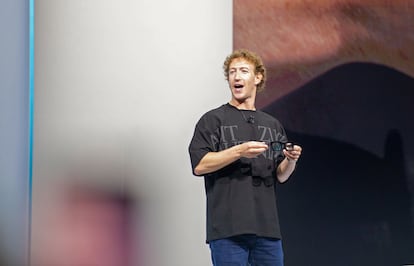Legend has it that Einstein purchased multiple versions of the same gray suit to avoid wasting brainpower on mundane decisions like choosing what to wear. This minimalist approach was later embraced by Steve Jobs. However, this philosophy of simplicity is being replaced by a new era marked by luxury and bling

“Welcome to the Zuckaissance! Meta’s CEO discovers street style,” writes journalist Helen Rumbelow in an article for The Times, analyzing the striking changes in Mark Zuckerberg’s appearance in recent months. “Mark Zuckerberg has finally ditched his drab gray hoodie and embraced life as ‘the gangsterist tech bro’ billionaire,” she notes. Indeed, the once-discreet tech guru is not just making a fashion statement; he has recently shared with his followers that he has purchased not one, but two Porsche cars. He now frequently adorns himself with gold chains like a rapper, and wears trendy oversized sweatshirts, featuring bold statements like Carthago delenda est (Carthage must be destroyed).
What’s more, Zuckerberg has let his unruly curls grow out, moving away from his former Roman emperor-style haircut. He now surfs, boxes in front of his fans, and —most notably — smiles more often than ever. His transformation has been so dramatic that it even caught the attention of another Californian guru, albeit one from the lifestyle realm rather than the tech industry. Gwyneth Paltrow commented on one of his photos, saying, “He looks like my ex hubs in this pic,” referencing Chris Martin, the lead singer of Coldplay. And it’s true there is some resemblance.
The CEO of Meta, who recently turned 40, appears to have entered a new phase in his life: carefree, cheerful, and noticeably tanned. “I don’t apologize for anything anymore,” he said in September during an episode of the Acquired podcast. The world has certainly taken notice. Moreover, there is a growing number of theories about these changes. An article on TechCrunch summed them up in two questions: “Mark Zuckerberg’s makeover: Midlife crisis or carefully crafted rebrand?” However, to address the latter, it’s essential to first consider why Zuckerberg began wearing gray sweatshirts in the first place.
In David Cronenberg’s 1986 film The Fly, an attractive and bold journalist, played by Geena Davis, encounters a brilliant yet eccentric scientist at a party. This scientist, portrayed by the charismatic Jeff Goldblum, confidently declares that he is about to change the world as we know it — and he does. He embodies the archetype of the mad genius, whose quirks are not only excused but often celebrated in light of his groundbreaking work. During a conversation, the journalist asks the scientist why he never changes his clothes. He responds that he wears the same gray suit every day, having purchased multiple identical versions to save time on daily decisions —”like Einstein did,” he adds.
This reference to Albert Einstein suggests that the famed physicist bought several of the same gray suit to avoid wasting his intellectual capacity on what to wear each morning. Although this information has never been substantiated, and the reality could be quite different — given that dress codes were more rigid during Einstein’s era and fast fashion had yet to emerge — it has made little difference. The concept of decision fatigue, coupled with the notion of a genius who cannot afford to squander a moment on trivialities, has firmly rooted itself in the popular imagination.
Later, Steve Jobs (1955-2011) emerged, perhaps inspired by the legend of Einstein’s suits. He adopted a uniform for work that would make him a style icon in his own right, asserting that this choice was made to optimize his time as much as possible. Jobs’ uniform consisted of a black turtleneck sweater designed by Issey Miyake, Levi’s jeans, and New Balance sneakers — a minimalist, frugal, and elegant style that perfectly complemented the brand he co-founded and represented, Apple, along with its popular slogan, “Think Different.” This was particularly striking considering that even Jobs’ contemporaries in the tech world, such as Microsoft co-founder Bill Gates, typically donned the classic executive suit.
As the boomers gave way to the millennials, Mark Zuckerberg emerged as a symbol of a new generation of young people seeking their place in the tech world. Zuckerberg’s uniform was even more casual than Jobs’s, yet they shared one fundamental trait: it was always the same. For years, the creator of Facebook has favored a gray T-shirt, jeans, and sneakers. “I feel like I’m not doing my job if I spend any of my energy on things that are silly or frivolous about my life,” he explained in 2012, revealing that he kept 20 identical T-shirts in a drawer at Facebook’s headquarters. This simplicity resonated throughout Silicon Valley, signaling a shift in priorities.
Since then, the style of aspiring tech gurus has revolved around concepts like personal performance and resource optimization, which manifested in gray sweatshirts and sneakers. The message was clear: no self-respecting genius could afford to waste 15 minutes choosing a tie. “In the Silicon Valley, not caring about your clothing is a badge of honor, a sign that you have more important things to worry about than what you wear,” sociologist Carrie Yodanis writes in her book, Getting Dressed. “Not caring about how you look is a privilege, available to those who have a higher social status.”
It wasn’t just Zuckerberg; other leading figures of the millennial tech wave, such as Jack Dorsey, founder of Twitter, and Evan Spiegel, founder of Snapchat, also embraced a casual, almost careless style. But that seems to be changing.
Zuckerberg isn’t the only tech mogul to have transformed his appearance in recent years. Another widely discussed makeover is that of Amazon founder Jeff Bezos. Once known as “the frugal billionaire” for his simple, almost monastic lifestyle, Bezos is now the king of bling. Yachts, mansions, and vacations with celebrities like Katy Perry, Orlando Bloom, and Usher have become staples of his new identity. His wardrobe has also evolved, with Bezos swapping out discreet chinos and plain T-shirts for cowboy boots and hats.
Like Zuckerberg, Bezos’s transformation has been attributed to a midlife crisis, sparked by his 2019 divorce from his wife of 25 years, MacKenzie Bezos, and his subsequent relationship with TV presenter Lauren Sanchez. However, this explanation seems too simplistic for one of the world’s richest men. Around the same time, Bezos stepped down as CEO of Amazon in 2021, though he remained on its board of directors. This shift may have allowed him to shed the image of a cautious leader who needed to reassure investors.
In a world where appearances don’t matter in theory, but in reality matter a great deal, Zuckerberg’s midlife crisis is more about strategy than a midlife crisis. This is how The Guardian columnist Arwa Mahdawi put it in a piece titled It’s Mark Zuckerberg as we’ve never seen him! But what’s really behind the new look? “A cynic might consider […] that this is part of a wider strategic overhaul of the tech mogul’s public image,” she writes. “Meta is embroiled in an anti-monopoly lawsuit and is being sued by dozens of states alleging that Facebook and Instagram are exploiting children to boost profits. Far better, don’t you think, that we all talk about how handsome a bearded Zuck would be rather than dwell on Meta’s less attractive business practices?”
The Times suggests that Zuckerberg’s image makeover might be more than just a distraction — it could be part of a long-term strategy. “In 2020 he had discussions with his longtime mentor and former board member Peter Thiel. They agreed Zuckerberg had to become aspirational for young customers,” the article reports.
Some of these discussions between Zuckerberg and Thiel came to light in 2020 after the Tennessee attorney general filed a lawsuit against Meta. In one email, the rebranding was addressed: “As the head of the most successful millennial tech company, it makes more sense for Zuckerberg to present himself as ‘millennial spokesperson,’ rather than ‘Mark as a baby boomer construct of how a well-behaved millennial is supposed to act.’”
With a net worth of $200 billion and a company that has already transformed the world, Zuckerberg, or “Zuck” as he presents himself on Instagram, no longer has to prove anything to anyone. Gone is the need to maintain the image of the millennial tech nerd who’s too busy to bother with what shirt to wear each morning. The workaholic leader aesthetic no longer resonates with the aspirations of Gen Z. Instead, what appeals to these younger generations, and what Meta hopes to capture, is the visible signs of success: yachts, luxury cars, and flashy bling.
Mark Zuckerberg’s style evolution may signal a broader shift in Silicon Valley’s culture, much like the hoodie and sneakers once did. It’s a glimpse of what’s to come. His new look — complete with Porsches, lavish vacations, and boxing lessons — seems to suggest that even geniuses can, and should, carve out time for themselves. The message: success means more than endless work; it’s about enjoying the rewards, too.



